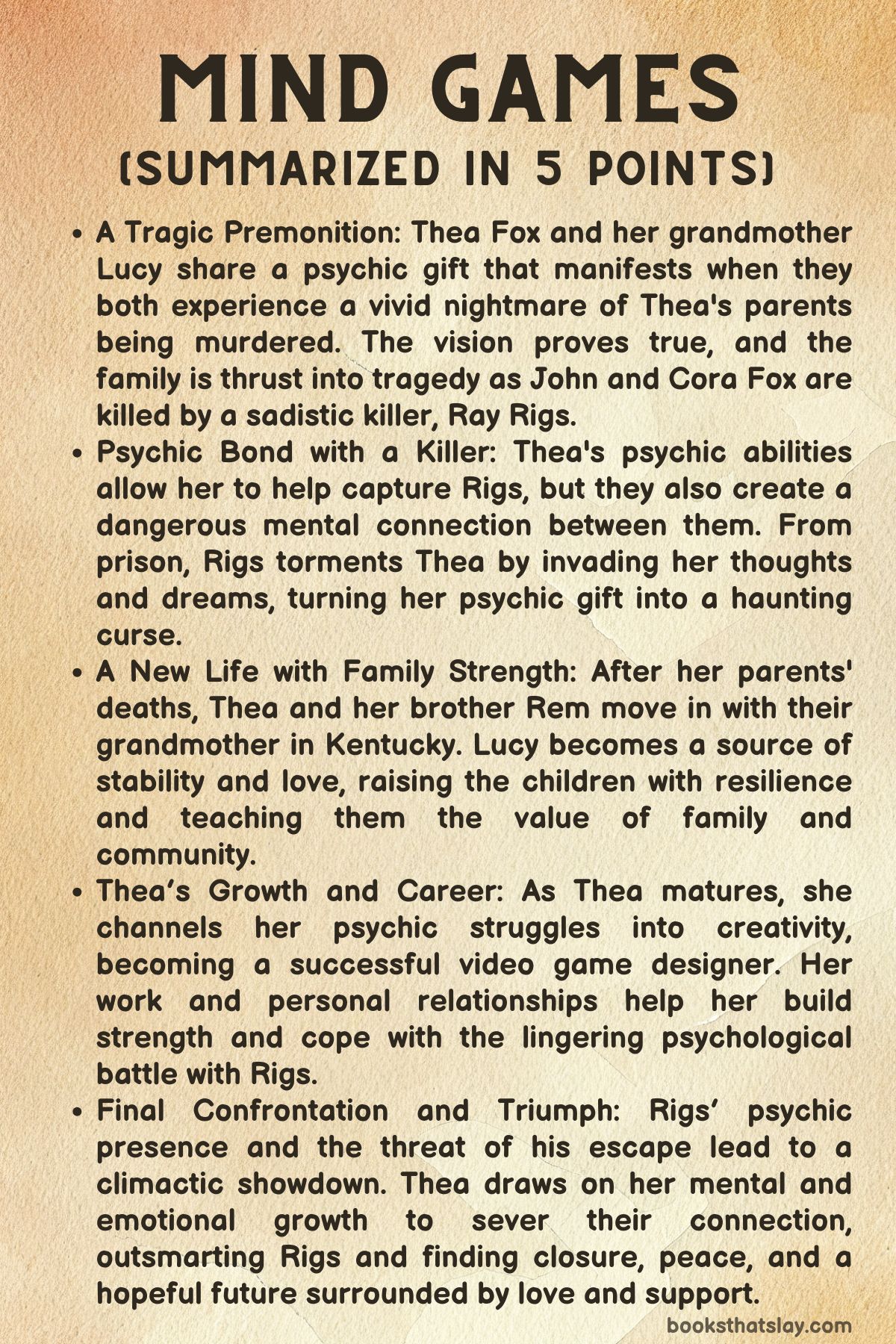Mind Games by Nora Roberts Summary, Characters and Themes
“Mind Games” by Nora Roberts is a gripping blend of suspense, psychological intrigue, and heartfelt family drama. The novel explores themes of tragedy, resilience, and the supernatural through the story of Thea, a girl with a psychic gift that connects her to a dangerous killer.
Set against the evocative backdrop of Appalachia, the narrative weaves a tale of love, loss, and redemption as Thea grows from a traumatized child into a strong, determined woman. With its vivid setting, complex characters, and a tense battle of minds, the book offers an unforgettable journey of survival and triumph.
Summary
Each summer, Thea Fox and her younger brother, Rem, spend two idyllic weeks at their grandmother Lucy’s farm in Redbud Hollow, Kentucky. Lucy, a resourceful and loving woman, teaches the children about the simple joys of rural life, from making candles to harvesting fresh produce.
This annual visit is a cherished tradition, providing a warm respite from their suburban life in Virginia with parents John and Cora.
However, one fateful summer, the Fox family’s lives are irrevocably shattered. As John and Cora drive back home, Thea and Lucy awaken from a shared nightmare—a terrifying vision of John and Cora’s brutal murder.
This psychic connection is a gift both women share, though Thea’s abilities are far stronger.
Their worst fears are confirmed when the police report the deaths of John and Cora, victims of a deranged killer, Ray Rigs, who targeted them for their wealth.
Thea’s visions play a pivotal role in capturing Rigs, as she provides the authorities with chillingly accurate details of the crime. But her connection to the killer does not end with his incarceration.
Rigs, too, possesses psychic abilities, creating a sinister link that allows him to invade Thea’s mind and torment her from prison. For years, this mental invasion becomes a battle of wills, with Thea forced to endure his twisted thoughts and vengeful presence.
After their parents’ deaths, Thea and Rem move in with Lucy, despite opposition from their wealthy paternal grandparents. Under Lucy’s steadfast care, the siblings find a new sense of stability.
Lucy becomes a pillar of strength, guiding them through their grief and teaching them resilience. Thea and Rem forge a deep bond, united by shared trauma and the supportive environment Lucy creates.
As Thea grows older, her psychic abilities remain a double-edged sword. She channels her intelligence and creativity into a career as a video game designer, using her work to create mental dreamscapes that help her confront the lingering presence of Rigs.
This innovative coping mechanism highlights Thea’s strength and ingenuity. Along the way, she builds meaningful friendships and, eventually, a romantic relationship with Ty, whose love and support add warmth to her journey.
Despite being imprisoned, Rigs remains a looming threat, his psychic influence casting a dark shadow over Thea’s life.
When rumors of his potential escape surface, Thea must prepare for a final confrontation.
She draws on years of mental and emotional growth, as well as the unwavering support of her family and friends, to face her tormentor. The climax is a psychological battle as much as a physical one, with Thea using her inner strength to sever the connection and ensure her safety.
In the end, Thea emerges victorious, having conquered her fears and outsmarted her enemy.
The novel concludes on a hopeful note, celebrating themes of love, resilience, and personal triumph, as Thea finally finds peace and closure.

Characters
Thea Fox
The protagonist of Mind Games, Thea Fox, is a compelling character whose development spans from childhood through adulthood. She begins the story as a twelve-year-old girl, bright and inquisitive, with a natural connection to her grandmother, Lucy.
The psychic abilities she shares with Lucy make her both a victim and a heroine. As a child, Thea’s gift is raw and uncontrolled, bringing her traumatic visions that she struggles to understand.
Her parents’ murder catalyzes her transformation, forcing her to confront her abilities head-on. As she grows, Thea’s journey reflects resilience and emotional strength.
Her career as a video game designer showcases her intelligence and creativity, providing her with an outlet for empowerment. Thea’s romantic relationship later in the novel reveals her capacity for vulnerability and love despite her haunted past.
She ultimately evolves into a complex and well-rounded individual, overcoming the mental and emotional scars left by her psychic connection to the killer.
Lucy Fox (Grammie)
Lucy, the grandmother, is a pillar of strength and wisdom in Thea’s life. As the matriarch of the family, Lucy is warm, loving, and fiercely protective.
Her Appalachian roots and resourcefulness make her a compelling character who embodies the resilience and self-sufficiency of the region. Lucy’s psychic abilities, which she refers to as a gift, become a source of guidance for Thea, though they also reflect Lucy’s own struggles with the weight of their shared curse.
Her determination to gain custody of Thea and Rem after their parents’ murder demonstrates her unwavering devotion to her grandchildren. Lucy’s nurturing nature is balanced by her toughness, as she provides the children with a safe, structured environment in which to heal.
Her role in the story is not just as a caregiver but also as a mentor who teaches Thea how to navigate the complexities of their psychic abilities and confront the darkness that plagues them.
Rem Fox
Thea’s younger brother, Rem, is a charming and resilient character who provides a sense of balance and lightness to the story. Despite his own grief over their parents’ death, Rem exhibits a pragmatic and humorous outlook that helps both himself and Thea cope.
As a child, he looks up to his sister, often relying on her strength while offering his unwavering support. Their sibling bond deepens over the years, marked by moments of bickering and camaraderie that feel authentic.
As he matures, Rem becomes more independent, pursuing his own path while remaining deeply connected to his family. His character serves as a reminder of the importance of sibling relationships in overcoming shared trauma.
John and Cora Fox
Though their time in the story is brief, John and Cora Fox leave a lasting impression. John is portrayed as a caring father, and Cora as a nurturing yet ambitious mother who balances her family life with her career.
Their love for Thea and Rem is evident in the idyllic family traditions they create, such as the annual trips to Redbud Hollow. Their tragic deaths serve as the inciting incident of the novel, shaping the lives of Thea and Rem in profound ways.
While they are not present for much of the story, their memory and influence linger, driving Thea’s determination to honor their legacy and find justice for their murder.
Ray Rigs
Ray Rigs is a chilling and multifaceted villain who serves as the antithesis to Thea’s character. His psychic abilities mirror Thea’s, creating an unnerving connection between the two.
Ray is portrayed as sadistic and calculating, with a deep-seated desire for power and control. His invasion of Thea’s thoughts and dreams makes him a constant presence in her life, even from prison.
What makes Ray particularly menacing is his ability to manipulate and instill fear without direct physical action. His character embodies the psychological terror that Thea must overcome, emphasizing the novel’s central theme of resilience in the face of darkness.
His ultimate defeat is not just a triumph over a physical adversary but a victory over the mental and emotional torment he represents.
Ty (Thea’s Love Interest)
Ty, Thea’s romantic partner, is introduced later in the novel, adding a layer of warmth and tenderness to the story. He is patient and understanding, offering Thea a safe space to be vulnerable despite her psychic burdens.
Ty’s character is grounded and supportive, acting as a counterbalance to the turmoil Thea experiences. Though their relationship faces challenges, including the complexities of Thea’s psychic abilities and her haunted past, Ty’s unwavering commitment helps Thea heal and grow.
His presence underscores the novel’s theme of love as a source of strength and renewal.
Themes
The Psychic Legacy and the Burden of Inherited Power
At the heart of Mind Games is the intricate exploration of psychic abilities as both a legacy and a burden. Thea’s powers are not framed as unequivocal gifts but as deeply complex phenomena that tie her to the darkest corners of humanity.
Inheriting these abilities from her grandmother, Lucy, Thea becomes part of a lineage that wields an extraordinary tool yet pays a steep price for it. This psychic connection highlights not just a shared ability but also a shared vulnerability.
The shared nightmare of Thea and Lucy becomes a metaphor for how trauma, like inherited power, can transcend generations. Lucy’s earlier experiences mirror Thea’s eventual confrontation with Ray Rigs, suggesting the cyclical nature of such burdens.
The novel also raises questions about the responsibility that comes with such power. Thea’s reluctance to embrace her abilities and her perception of them as a curse suggest a tension between agency and destiny.
Trauma as a Lifelong Companion and the Path to Resilience
Trauma is not depicted in Mind Games as a singular event but as a pervasive force that shapes Thea’s life. The murder of her parents is the inciting incident, but its aftermath ripples across decades.
Thea’s psychic connection to the killer deepens this exploration. She is forced to live not only with the memory of the tragedy but also with the active intrusion of evil into her mind.
The novel portrays healing as a process of coexistence with pain rather than its eradication. Thea’s ultimate confrontation with Ray Rigs symbolizes a victory over both external threats and internal scars.
Roberts underscores the idea that healing is about finding strength within trauma. This nuanced depiction of resilience highlights the complexities of personal growth.
Familial Bonds as Anchors in a World of Chaos
The role of family is central to Mind Games, presenting it as a source of stability amid chaos. Lucy, the matriarch, embodies unconditional love and resilience, becoming a pillar for Thea and Rem.
Her farm in Redbud Hollow is more than a setting—it is a sanctuary. It offers a safe space for Thea and Rem to process grief and rebuild their lives.
The sibling bond between Thea and Rem adds another layer to this theme. Their relationship, marked by moments of tension and solidarity, reflects the complexities of shared trauma.
These familial connections act as a counterbalance to the chaos introduced by Ray Rigs. They highlight the transformative power of love and support in overcoming adversity.
The Appalachians as a Metaphor for Cultural Identity and Isolation
The Appalachian landscape in Mind Games is not just a backdrop but a metaphor for identity and isolation. The rural setting is rich in heritage, reflecting a way of life that is both grounding and isolating.
Lucy’s connection to the land symbolizes resilience and self-reliance. These qualities are passed down to Thea and Rem, shaping their character and outlook.
The isolation of Appalachia mirrors Thea’s psychic and emotional solitude. Her abilities create a chasm between her and the rest of the world, much like the physical distance of Redbud Hollow.
The novel ties personal and geographical isolation into a unified theme. It shows how solitude can be both a source of strength and a barrier to connection.
The Psychological Landscape of Evil and the Ethics of Confrontation
Ray Rigs is more than a villain; he represents the pervasive nature of evil. His psychic connection with Thea transforms their conflict into a battle of minds.
This theme explores the ethics of confronting such malevolence. Thea’s struggle with Rigs is as much about reclaiming her mental autonomy as it is about defeating him.
The psychological toll of this confrontation is profound. Thea must grapple with the darker aspects of her psyche to resist Rigs’s influence.
Roberts uses this conflict to interrogate the nature of justice and vengeance. The resolution of their battle symbolizes a triumph of resilience over malice.
The Intersection of Gender and Power in Professional and Psychic Arenas
Thea’s journey into the male-dominated field of video game design highlights the intersection of gender and power. Her career success parallels her mastery of psychic abilities, framing her story as one of empowerment.
The novel uses her professional achievements to explore the broader struggles women face in claiming authority. Thea’s strength becomes a metaphor for navigating hostile environments.
Her psychic battles mirror this struggle. The ability to craft dreamscapes and confront Rigs symbolizes the creative and intellectual labor women perform to overcome barriers.
Roberts intertwines these arenas to create a layered exploration of power and gender. Thea’s journey reflects how women harness unique strengths to confront challenges.


